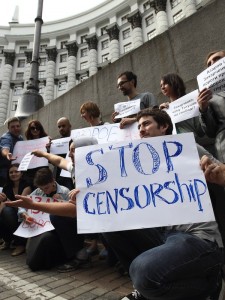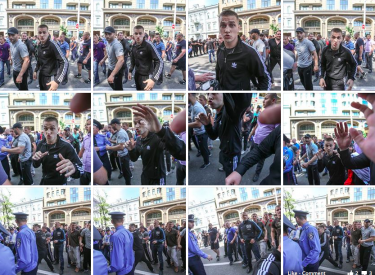Thursday, May 30, 2013
May 18 was a busy day in Ukraine's capital Kyiv. Thousands of people gathered in central Kyiv for the opposition's "Arise, Ukraine!" rally (photos), and for the ruling Party of Regions' march against what they described as "fascism" - though, in fact, theirs was more of an anti-opposition event (photo, video; ru, uk). There were also celebrations of Europe Day; an LGBT rights flashmob (photos - here and here); the 9th annual Freedom March, whose participants demanded drug policy reform (video; uk); the Night of Museums; and the televised Grand Final of the Eurovision Song Contest 2013, in which the Ukrainian representative finished third.
None of the highlights of this eventful Saturday was destined to leave any significant trace in public memory, however. Not even the well-rehearsed and much-anticipated speeches by some of Ukraine's top politicians.
Two weeks later, only one incident - an attack on journalists that the police first failed to prevent and then failed to investigate properly - still remains in the spotlight, fueling online discussions and real-life protests.
The journalists - TV reporter Olha Snitsarchuk [uk] and her husband, photographer Vlad Sodel [uk] - were attacked after both political rallies had come to an end, as they were filming a fight that broke out between supporters of the ultra-right opposition party VO Svoboda and a group of young men in tracksuits. Another journalist, Odessa-based Valeriya Ivashkina [ru], was filming and was attacked, too; below is one of the videos she made, which shows the beginning of the skirmish:
The Committee to Protect Journalists gave this quick account [en] of what happened, in a statement issued on May 20:
Several assailants beat two reporters covering an opposition protest outside Ukrainian Interior Ministry headquarters in Kiev on Saturday in view of police officers who failed to intervene, according to local [ru] and international [en] press reports. [...]
[...]
Assailants punched and kicked Vladislav Sodel, a photographer with the Moscow-based daily Kommersant, and his wife, Olga Snitsarchuk, a reporter with Kiev's Channel Five television. Sodel said they repeatedly called out for help from nearby police but their pleas were ignored, Ukrainska Pravda reported [ru]. [...]
The assailants had clashed with opposition protesters before attacking Snitsarchuk and Sodel, the independent news website Ukrainska Pravda reported [ru]. Images and video taken at the scene show more than a half dozen police officers were nearby. [...]
Sodel managed to take some photos while being attacked:
Within hours of the incident, Ukrainian netizens unearthed the VKontakte page photos of the most conspicuous of the assailants - the young man in a black Adidas tracksuit, who featured prominently not just in Sodel's photos, but in this video by Ivashkina as well:
Netizens soon identified the man as Vadym Titushko, nicknamed 'Rumyn' ("a Romanian"), a 20-year-old resident of Bila Tserkva, a town near Kyiv. Once a promising junior athlete specializing in various martial arts, Titushko was now using his fighting skills to earn some cash as a security guard at political rallies. As Tetyana Danylenko wrote [uk] on Facebook, such moonlighting appears to be a common practice among young athletic people in Ukraine's small towns:
At Bila Tserkva's fight clubs, what people like [Titushko] do is regarded simply as business. For children who train there, this "business" isn't just inevitable future, but, to some extent, even a dream. [...]
In a video statement [ru] that he posted on YouTube on May 20, two days after gaining his dubious fame, he claimed that he and his friends had been hired to protect the opposition rally on May 18:
Iurii Panin and other journalists, however, compiled and presented photo and video evidence that suggested that Titushko and his friends had been working at the Party of Regions' event that day:
The police initially refused to search for Titushko, and so on May 20, dozens of journalists (as well as some politicians) protested police inaction in front of the Ministry of Internal Affairs in Kyiv (photos).
Titushko was detained and charged with hooliganism on May 21, but was then released on $2,800 bail [22,940 hryvnias; uk] on May 22 (photos). In his court testimony, he said [ru] that he and his friends had not attacked anyone but acted in self-defense, and that the journalists provoked them with their "incorrect words."

Ukrainian journalists protest in front of the Cabinet of Ministers in Kyiv. Photo by ukrafoto ukrainian news, copyright © Demotix (23/05/13).
Even though the police investigation finally appeared to be underway, journalists continued to protest.
On May 22, at a government session at the Cabinet of Ministers, a group of journalists turned their backs on PM Mykola Azarov, to let him and others see the posters attached to their shirts: "Today the [female] journalist. Tomorrow your wife, sister, daughter. Act!" Azarov reacted by ordering their accreditations to be revoked. On May 23, however, another group of journalists staged a protest outside the Cabinet of Ministers to support their colleagues - which must have prompted Azarov to change his mind about the order he had given.
On May 27, a group of journalists, together with activists of the Stop Censorship! Movement [uk], put more pressure on the authorities, by setting up a tent in front of the Ministry of Internal Affairs, despite some resistance [uk] from the police. They called the tent a "temporary information center" and spent three days and two nights taking turns to guard it. On May 29, they summed up the results [uk] of the ongoing investigation into the beating of Snitsarchuk and Sodel ten days earlier, and dismantled the tent voluntarily.
On May 30, a representative of the Ministry of Internal Affairs announced [uk] that disciplinary action was taken against 15 police officers who had "failed to act decisively" during the May 18 confrontation.
The issue of the safety of journalists has always been relevant in Ukraine. On Facebook, Kostiantyn Stogniy mentioned [ru] that even though it's been over six months since the attack on TV journalist Anna Petrenko in early September 2012, the perpetrator has not been brought to justice yet. And on May 25, at the height of the public outrage over the May 18 attack, two more journalists were beaten: one, Andriy Kachor, in the town of Brovary [uk] near Kyiv, and the other one, Vyacheslav Konovalov, in Kyiv [ru]. These cases, however, have not received as much attention as the attack on Snitsarchuk and Sodel.
Blogger LEvko of Foreign Notes translated Ukrainian journalist Mustafa Nayyem's explanation [ru] of what the attacks against journalists and the journalists' fight against violence mean in a broader context:
[...] The feeling of powerlessness and humiliation experienced by my [journalist] colleagues, is, every day and every minute, also experienced by millions of other Ukrainians. Not because they are being hit and sworn at. But because, with the advent of the current authorities, malevolence, rudeness and animal instincts are increasingly winning [the day]. All this is occurring not just openly, but demonstratively and is accompanied with a silent grin by a party which is cultivating total permissiveness based on the rights of greater force.
If it is not stopped, there will be war. But not over slogans, not over parties and not over languages. But over [the right for] basic human dignity. [...]

1 comment:
It's always a pleasure to visit your website since you write so beautifully. Your writing is impressive, and I hope you will keep it up.
DaVinci Resolve Studio
Post a Comment